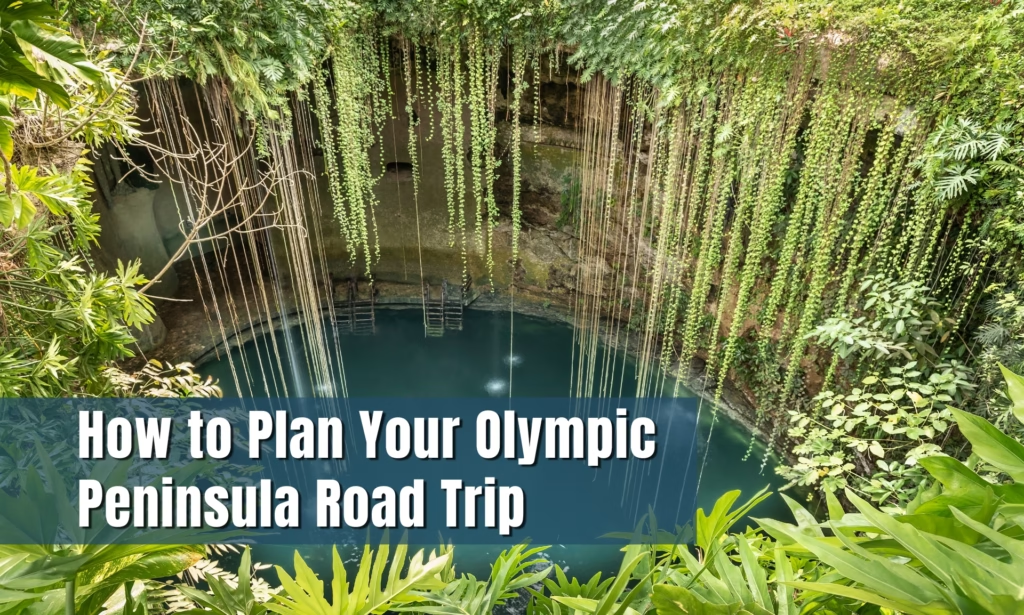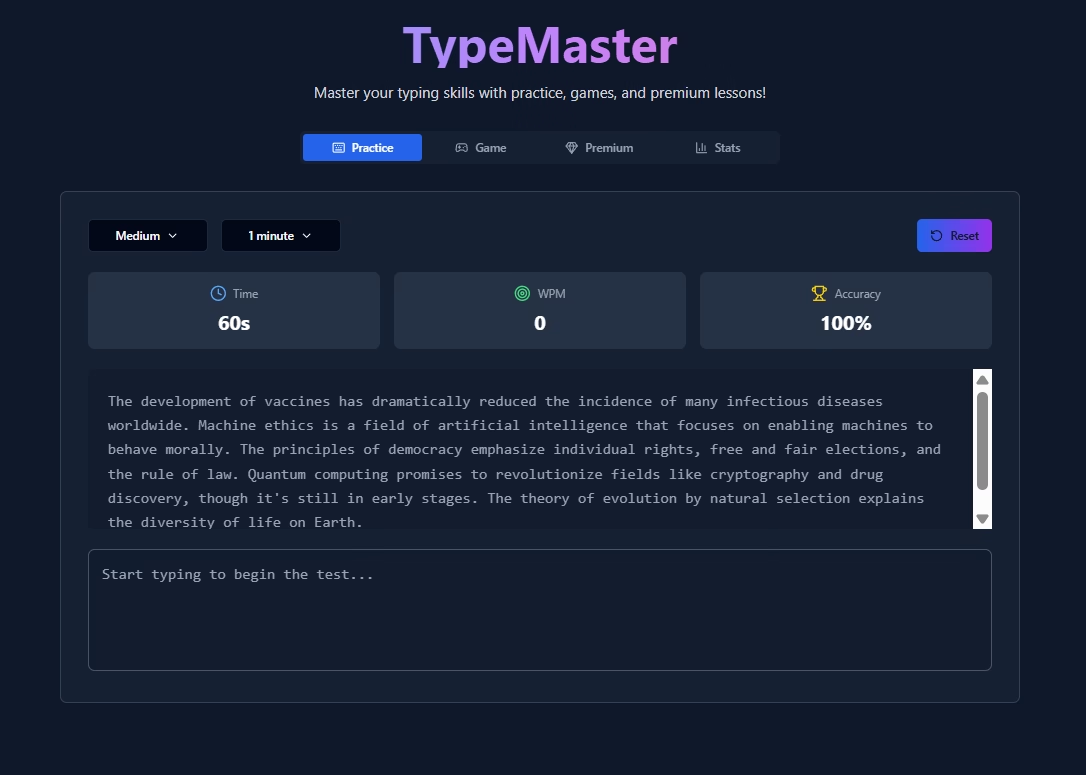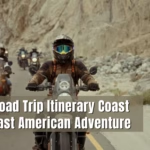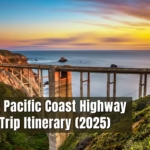Introduction to the Olympic Peninsula Loop

What is the Olympic Peninsula Loop?
The Olympic Peninsula Loop is a 300+ mile scenic byway encircling Washington’s Olympic Peninsula. Starting from the city of Olympia and stretching all the way around the Olympic National Park, this route offers a unique blend of rugged coastline, temperate rainforests, alpine peaks, and tranquil lakes. It’s often considered one of the most picturesque road trips in the Pacific Northwest.
Why It’s a Must-Do Scenic Drive in Washington
Not only does this loop deliver incredible landscapes, but it also introduces travelers to the diverse ecosystems of Olympic National Park—a UNESCO World Heritage Site. From snow-capped mountains to the mossy depths of the Hoh Rain Forest, it’s a trip that appeals to nature lovers, photographers, and adventure seekers alike.
How to Plan Your Olympic Peninsula Road Trip
Best Time to Visit
The ideal time to embark on the Olympic Peninsula Loop is from late spring through early fall (May–October). This window offers the most consistent weather, clearer skies, and open access to high-elevation destinations like Hurricane Ridge.
Duration and Route Overview
To truly appreciate the loop, allocate at least 3 to 5 days. While you can drive it in a single day, you’d miss out on the natural wonders and hiking opportunities. The loop begins and ends in Olympia or Seattle (depending on your access point), and follows US Highway 101 in a clockwise or counterclockwise direction.
Map and Navigation Tips
A detailed map or GPS-enabled app is essential. While cell service can be spotty in remote areas, offline maps will help you navigate between lesser-known gems and well-marked trailheads.
Top Highlights Along the Olympic Peninsula Loop
Hurricane Ridge
One of the most accessible mountain areas within Olympic National Park, Hurricane Ridge offers panoramic views of the Olympic Mountains and the Strait of Juan de Fuca. Visit during daylight for hiking or snowshoeing in the winter.
Hoh Rain Forest
A magical world of moss-draped trees and dense, verdant trails. The Hall of Mosses Trail is a must for first-time visitors.
Rialto and Ruby Beach
These iconic beaches along the Pacific coast showcase sea stacks, tide pools, and dramatic sunsets. Don’t miss the sea-carved Hole-in-the-Wall near Rialto.
Cape Flattery
As the northwesternmost point in the contiguous U.S., Cape Flattery offers breathtaking cliffside views and a boardwalk trail through coastal forest.
Lake Crescent and Sol Duc
Pristine Lake Crescent is ideal for kayaking, while nearby Sol Duc offers waterfalls and a relaxing soak in the hot springs.
Best Towns to Stop Along the Loop
Port Angeles
Port Angeles is the gateway to Olympic National Park and a perfect basecamp. It offers visitor centers, cozy lodgings, and quick access to Hurricane Ridge and Lake Crescent. Don’t miss the downtown waterfront, which boasts shops, museums, and excellent dining options.
Forks
Made famous by the Twilight series, Forks is a rustic logging town nestled near the Hoh Rain Forest and Pacific coast beaches. It’s an ideal stop for nature lovers and book fans alike.
Sequim
Known as the “Lavender Capital of North America,” Sequim features fields of vibrant purple blooms in the summer. It’s also home to the Dungeness Spit—a long, narrow sand spit perfect for birdwatching and photography.
Aberdeen
Located at the southern end of the loop, Aberdeen is rich in logging history and is the hometown of Nirvana’s Kurt Cobain. It’s a practical stop for fuel, food, and regional culture.
Things to Do Along the Olympic Peninsula Loop
Hiking and Outdoor Adventures
The Olympic Peninsula boasts hundreds of miles of trails. Some top hikes include:
- Marymere Falls Trail – Short and family-friendly near Lake Crescent.
- Hurricane Hill Trail – Sweeping alpine views.
- Second Beach Trail – Coastal beauty and sea stacks.
Wildlife Viewing
The loop is home to black bears, Roosevelt elk, bald eagles, and even whales along the coast. Bring binoculars and keep a respectful distance from all wildlife.
Hot Springs and Waterfalls
- Sol Duc Hot Springs – A resort with hot pools and nearby hiking.
- Madison Falls and Marymere Falls – Easily accessible waterfalls that offer serene natural beauty.
Cultural and Historical Sites
Visit the Makah Cultural & Research Center in Neah Bay to learn about the area’s Indigenous heritage. Don’t miss the Elwha River Restoration site—part of the largest dam removal project in U.S. history.
Where to Stay on the Olympic Peninsula Loop
Campgrounds and RV Parks
The peninsula offers many beautiful campgrounds:
- Kalaloch Campground – Oceanfront views.
- Hoh Campground – Rainforest immersion.
- Heart O’ the Hills – Near Hurricane Ridge.
Lodges and Cabins
Rustic and cozy, perfect for families and couples:
- Lake Crescent Lodge – Historic charm and lake views.
- Log Cabin Resort – Great for larger groups.
Budget and Boutique Hotels
In towns like Port Angeles and Forks, you’ll find everything from chains to locally-owned motels and boutique inns.
Dining and Local Eats
Seafood and Regional Delicacies
Feast on fresh Dungeness crab, salmon, and oysters straight from the Pacific. Popular spots include:
- Next Door Gastropub (Port Angeles)
- Blake’slees Bar & Grill (Forks)
Best Cafés and Bakeries
Refuel with local coffee and baked treats:
- Hurricane Coffee Co. (Sequim)
- Pane d’Amore Artisan Bakery
Farm-to-Table Experiences
Seasonal farmers markets in Sequim and Port Angeles highlight locally-grown produce, dairy, and artisan goods.
Safety and Travel Tips for First-Time Visitors
Driving Conditions
US-101 is well-paved but expect narrow, winding stretches. Drive cautiously during rain and fog, especially along coastal cliffs and forested roads.
Weather Considerations
The region receives significant rainfall, especially in fall and winter. Summer is drier but still pack layers for changing mountain and coastal climates.
Park Fees and Permits
A valid entrance pass is required for Olympic National Park areas. Consider the America the Beautiful pass if visiting multiple parks.
Packing List for a Perfect Peninsula Road Trip
Must-Have Gear
- Binoculars
- Camera with extra batteries
- National Park pass
- Reusable water bottle
Clothing Recommendations
- Waterproof jacket
- Comfortable hiking shoes
- Warm layers
- Quick-dry clothing
Travel Essentials
- Offline maps
- Flashlight or headlamp
- Snacks and cooler
- Emergency roadside kit
Olympic National Park vs Olympic Peninsula Loop
What’s the Difference?
- Olympic National Park is a designated federal parkland.
- Olympic Peninsula Loop refers to the driving route that circles the peninsula and passes through or near the park’s main attractions.
How They Intersect
The loop is the best way to access the most iconic parts of the national park, making them complementary experiences.
Sustainable Travel on the Peninsula Loop
Leave No Trace Principles
- Stay on marked trails
- Pack out all trash
- Respect wildlife
Supporting Local Businesses
Buy from local artisans, eat at independently owned restaurants, and consider booking eco-certified lodgings.
Seasonal Itineraries for the Loop
Summer Adventures
Ideal for hiking, kayaking, and beachcombing. Roads are fully open, and visitor centers are in full swing.
Fall Foliage Tour
Vibrant leaves paint the forests, and crowds thin. Great for photographers and mushroom foragers.
Winter Snowshoeing & Hot Springs
Hurricane Ridge opens for snow activities. Sol Duc Hot Springs offers a warm soak after chilly hikes.
Spring Wildflowers and Waterfalls
As snow melts, waterfalls roar and wildflowers bloom in alpine meadows. A magical time for nature lovers.
Photo Stops You Can’t Miss
Best Viewpoints and Scenic Pull-Offs
- Hurricane Ridge Overlook
- Lake Crescent from the east end
- Cape Flattery cliffs
Sunrise and Sunset Locations
- Kalaloch Beach
- Rialto Beach
- Hurricane Ridge (sunrise)
FAQs about the Olympic Peninsula Loop (Washington)
Q1: How long does it take to drive the entire loop?
A: Without stops, about 6–8 hours. Ideally, spread it over 3–5 days to explore thoroughly.
Q2: Can you do the loop in one day?
A: Yes, but you’ll miss out on hikes and deeper exploration. One-day drives are best for a scenic overview.
Q3: Are pets allowed?
A: Pets are allowed in most developed areas but restricted on many trails in Olympic National Park. Check the NPS pet policy before visiting.
Q4: Is the road open year-round?
A: Yes, but some higher-elevation roads (like Hurricane Ridge) may close seasonally due to snow.
Q5: What’s the best direction to drive the loop?
A: Clockwise or counterclockwise both work, but clockwise from Olympia allows better coastal timing for sunsets.
Q6: Do I need a reservation for Olympic National Park?
A: No reservations are currently required to enter the park, but lodges and campgrounds should be booked in advance.
Conclusion: Why the Olympic Peninsula Loop Should Be on Your Bucket List
The Olympic Peninsula Loop offers a once-in-a-lifetime road trip through Washington’s most diverse and awe-inspiring landscapes. Whether you’re chasing waterfalls, relaxing in hot springs, or marveling at ocean sunsets, this scenic route offers something for every kind of traveler. With thoughtful planning and a spirit of adventure, your loop journey will become one of your most cherished travel memories.
Affiliate Products:
1. Reusable Water Bottle
Product: PEXPO Craft Pro 1000
2. Travel Camera or Smartphone Gimbal
Product: Handheld Gimbal Stabiliser
Other Content
Fayetteville AR USA – Top 17 Travel Gems You Shouldn’t Miss – Click Here >
Sedona Weekend Getaway- Best Weekend Trips from Phoenix, Arizona – Click Here >
Discover Alaska, USA: Best Place to Visit in Alaska For First Time – Click Here >
Summer Best Place to Visit in Alabama USA – Gulf Shores – Click Here >


